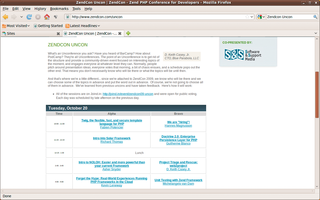
By Travis Swicegood
In October, San Jose, California played host to ZendCon, one of the largest PHP conferences of the season. This conference brought together a diverse cross-section of the open source community within PHP and the enterprises that depend on PHP. The result was a unique conference, with talks ranging from product pitches to how to get started contributing to PHP.
Andi Gutmans, co-founder of Zend, started the conference with the opening keynote. He highlighted the new Zend Server as well as Zend Studio, which is developed as an extension on top of the PHP Development Tools (PDT). PDT is Eclipse based and, as of October 2009, is the most popular Eclipse project.
Andi shared the keynote stage with presenters from Deutsche Telekom and Shaklee and with fellow Zenders, all of whom discussed projects they've worked on this past year involving PHP in the enterprise. Each attributed the success of their respective projects to PHP's being domain-specific to the web and to the rich community that has grown up around it.
This year's buzzword was definitely "cloud." Four sessions were devoted to various aspects of development and the cloud, with an entire keynote session devoted to the topic. A lot was made of PHP's shared-nothing architecture and how it fits well in a typical cloud environment in which you don't necessarily know what is available or from where.
A few other events happened in parallel to ZendCon. The PHP core team, those with karma and a few stragglers, held a core team meeting during the afternoon sessions on Wednesday. Among the topics discussed were the Google Summer of Code Extension API and Dependency Interface project - and how to best include it in php-src - and the future of PHP 5.3 and PHP 6.0.
Alongside the event again this year was the ZendCon UnCon. The UnCon's three tracks provided enough great talks to be an excellent conference without piggy-backing on ZendCon. Coupled with the five official tracks, however, the combined offerings provided a lot of hard choices for participants deciding which talks to attend.
My favorite talk of the conference was the UnCon talk by Josh Holmes titled "The Lost Art of Simplicity." Presented in a small UnCon session, it turned into an interactive session focusing on the mantra of the simplest solution that works. This mantra is nothing new to the open source community or to Linux in particular, but it's easy to lose sight, especially in commercial projects. I highly recommend attending this talk if you're at a conference where Josh is presenting it.
All conferences are only as good as their "hallway tracks," however, and ZendCon didn't disappoint. Besides lively discussion and debate in the large, albeit under-powered, common areas, plenty of camaraderie was had at the end of the day. Each day ended with a social event in the exhibit hall sponsored by Adobe.
Wednesday night's open bar was followed by the Meet the Zend Team session. A staple of ZendCon, these sessions become lively as the Zend Team fields all sorts of questions from the attendees, some of whom perhaps have taken a little too much advantage of the free beer and wine.
Wednesday night also saw an impromptu trip to San Francisco via a Microsoft-sponsored party bus and an evening of dancing at Web 2.0's Bing party. The night ended with free copies of Windows 7, which was likely promptly installed via the various VMs.
Microsoft, despite the behavior of some elements in the company, has hired a development evangelism team that really embraces the open source community. That, or they've taken embrace, extend, and extinguish to new levels and are trying to give the entire open source community liver damage!
Overall, ZendCon ranks among the best of the PHP-specific conferences. Add it to your list of fall conferences in 2010 because it's worth attending if you have an interest in PHP and how it is used throughout the open source and enterprise communities.